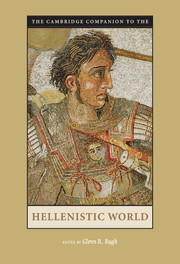Book contents
- Frontmatter
- Introduction
- 1 Alexander the Great and the Creation of the Hellenistic Age
- 2 The Hellenistic Kingdoms
- 3 The Polis and Federalism
- 4 Hellenistic Economies
- 5 The Hellenistic Family
- 6 History and Rhetoric
- 7 Material Culture
- 8 Hellenistic Art: Two Dozen Innovations
- 9 Language and Literature
- 10 Greek Religion: Continuity and Change in the Hellenistic Period
- 11 Philosophy for Life
- 12 Science, Medicine, and Technology
- 13 Hellenistic Military Developments
- 14 Greeks and Non-Greeks
- 15 Recent Trends and New Directions
- Hellenistic Dynasties
- Works Cited
- Index
9 - Language and Literature
Published online by Cambridge University Press: 28 November 2007
- Frontmatter
- Introduction
- 1 Alexander the Great and the Creation of the Hellenistic Age
- 2 The Hellenistic Kingdoms
- 3 The Polis and Federalism
- 4 Hellenistic Economies
- 5 The Hellenistic Family
- 6 History and Rhetoric
- 7 Material Culture
- 8 Hellenistic Art: Two Dozen Innovations
- 9 Language and Literature
- 10 Greek Religion: Continuity and Change in the Hellenistic Period
- 11 Philosophy for Life
- 12 Science, Medicine, and Technology
- 13 Hellenistic Military Developments
- 14 Greeks and Non-Greeks
- 15 Recent Trends and New Directions
- Hellenistic Dynasties
- Works Cited
- Index
Summary
Language: The Rise of the Koine
The army that marched through Asia under Alexander’s command included speakers of many regional Greek dialects, but its official, administrative language, spoken by its Macedonian leaders and used in formal documents, was a version of Attic, the dialect spoken at Athens. The evidence for a native “Macedonian” language is shadowy, but suggests that it was either an idiosyncratic variant of Greek or a closely related Indo-European language. Although the Macedonian royal house claimed to have its origins in Argos, where the spoken language was a form of Doric Greek, the political power and cultural influence exerted by Athens made its dialect particularly important for a philhellenic Macedonian court interested in laying claim to a Hellenic heritage. The formal adoption of Attic as the official language of the Macedonian court under Philip II was merely the culmination of a linguistic trend that had already been under way for more than half a century. Its consequences for the linguistic and cultural landscape of the Hellenistic period were monumental.
The version of Attic adopted by the Macedonian royal house differed in some respects from the local dialect spoken by ordinary Athenians. By the late fifth century, the influence of Ionic, a dialect closely related to Attic and spoken in many of the city-states that made up the Athenian empire, had led to the development of a “Greater Attic” dialect in which certain marked local morphological and syntactical features were diminished or eliminated entirely.
- Type
- Chapter
- Information
- The Cambridge Companion to the Hellenistic World , pp. 186 - 207Publisher: Cambridge University PressPrint publication year: 2006
- 14
- Cited by

